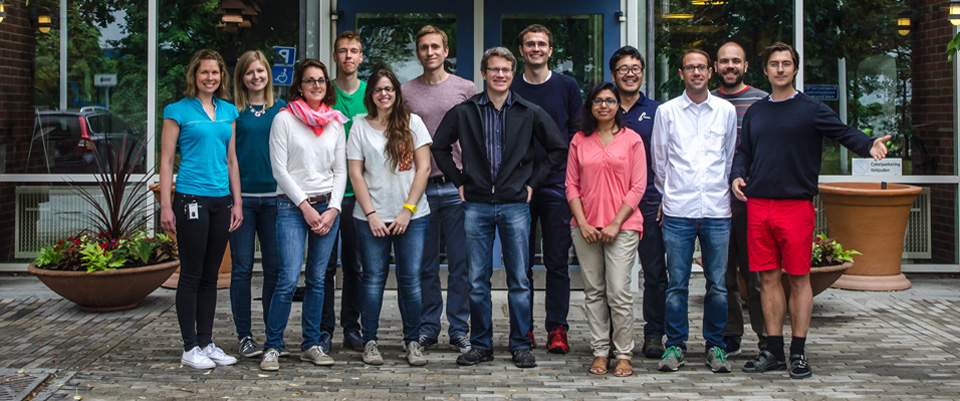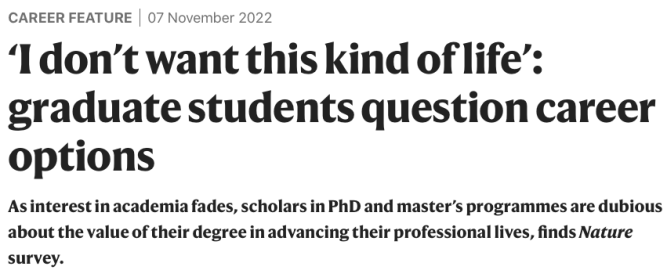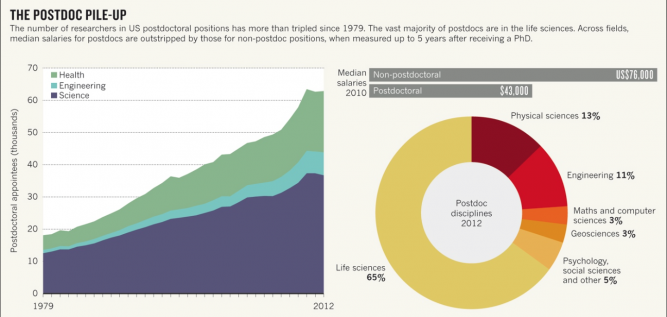Blog Tag academics
Falling behind: postdocs in their thirties tire of putting life on hold
This one hits home. As someone who did 4 postdocs in 3 different countries, I can see myself here. Particularly the waiting - always the waiting. Waiting to get that dream job. Waiting to buy a house. Waiting to start a family. At some point, my wife and I just had to take the plunge. Without permanent contracts. Without stable positions. Sweden certainly made that choice much easier with generous parental leave. However, the uncertainty and the effects upon our careers was real. I am happy to say that it has worked out for us in the long run, but it shouldn't be this way. It is insane that after spending the time to obtain a PhD, we then spend years and years in unstable positions. Academics needs to do better if it wants to retain people.
‘I don’t want this kind of life’: graduate students question career options
It has been a long time since I have posted anything here - and this article seemed like a great place to start. As we have all heard, there is a shift in the academic ether - a realisation that the "canonical" pathway from PhD to Postdoc to Professor may not be a realistic or even desired career goal for many. It is an important conversation - and hopefully one that the universities take to heart. In many ways, our relevance to the students that we serve is being questioned - and appropriately so. While I do not have the answers, I like to think that I am honest with the students and postdoctoral students who come work in my research group. Academic positions are few and far between these days - and in many ways undesirable. The key point for me is to communicate early with the person joining the lab about their expectations and goals. We can then tailor the project and their experience at the university to hopefully prepare them for the next step - wherever that may be. It is however important that we move away from the inherent bias that academics is a preferred career choice. Universities need to provide education and support for the multitude of careers available to the people who obtain an advanced degree. If we do not do so, then we do indeed risk seeing a decreased interest in a PhD.
The future of the postdoc
There is a growing number of postdocs and few places in academia for them to go. But change could be on the way.
Not for love or for money – why do a PhD?
Useful article in The Guardian
"The prestige power of the PhD is however on the wane. With mass education, the number of doctorate holders has increased exponentially, so that the elite membership and the high social status that comes with it is weakened. Especially in connection with a decrease in salary size for university professionals, doctorate holders are perhaps now not seen as exceptional but quirky: why choose to specialize narrowly, work so many hours, and for so little pay when one could get a more lucrative employment elsewhere?"
Rethinking graduate education
A useful editorial by Alan Leshner in Science that highlights the obvious problem that academic science is facing in the training of graduate students. Simply put, the vast majority of students who pass through graduate school will not have careers in academic science. However, the majority of training is focused on academics and other career paths are often considered to be of less value. Clearly unsustainable. All ponzi schemes fail eventually.
"What is needed is a fundamental system analysis and reconfiguration that results in graduate training programs that are better designed to meet the diverse career needs of today's students."
Rescuing US biomedical research from its systemic flaws

It has been clear for quite some time that there are an insufficient number of academic positions available for all of those who want to pursue an academic career. However, another question that is asked less often is how many of those individuals should pursue an academic career. An academic career is clearly not for everyone and nor should it be. The reality is that the majority of PhD students and postdocs will not become PIs at an academic institution. I think that one of the primary problems is that the academic community still pretends that we are only training future academic researchers - and even tends to look down upon those individuals who choose a different career path. This is statistical madness. We know that the odds of anyone from our research group securing an academic position are vanishingly small, yet we continue to pretend that we are only training academics - and that is all that is valued. Clearly the nature of the PhD and postdoctoral experience need to be broadened to encompass the range of career opportunities available to someone with critical thinking skills and analytical training.
Is Higher Education Worth the Price?
Interesting piece from the Economist on the return for investment on higher education. Given the associated costs, perspective students really need to be clear on why they are pursuing higher education.
Rescuing US biomedical research from its systemic flaws

Having an impact (factor)

While a little dated, this is a nice take on the ludicrous nature of the use of impact factors in academics















Leave a message